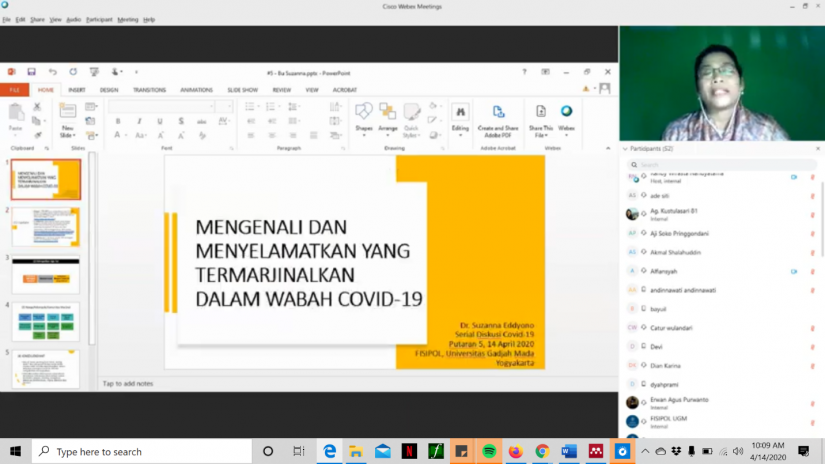
Yogyakarta, April 14th, 2020—Discussion series held by Faculty of Social and Political Sciences UGM (Fisipol UGM) has been occurring over the past two weeks. On Tuesday (4/14) the 5th series of the discussions took place with the theme “Rescuing Marginalized Groups from the Attack of COVID-19”. This discussion presented Dr. Suzanna Eddyono, Dr. Hendrie Adjie Kusworo, and Dr. Hempri Suyatna from the Department of Social Development and Welfare as the speakers, also Randy Nandyatama as the moderator. Held online via Webex and YouTube Fisipol UGM channel, this discussion was attended by approximately 60 participants and from 10.00 to 11.30 WIB.
The first session was presented by Dr. Suzanna Eddyono as the moderator directed the speaker. She delivered the subject on how COVID-19 affected marginalized groups, such as the poor, informal sector workers, women victims of domestic violence, to COVID-19 patients and medical workers who were stigmatized. According to her, the current policies still do not calculate the marginal groups, such as the suggestion of washing hands that 30% of Indonesian families found difficult, due to the lack of access to clean water. “The impact of COVID-19 experienced by each group is not the same, because the marginal group gets the brunt of it,” she said.
As the discussion continued, Dr. Hendrie Adjie Kusworo who laid out the interaction and the impact of COVID-19 for marginalized groups, who are also called as vulnerable groups. Forerunner groups such as medical officers, laboratory workers, TNI (Indonesian National Armed Forces), Polri (Indonesian National Police), and ASN (State Civil Apparatus) become vulnerable groups that deserve attention. “This group should get proper protection priority,” he explained. He also elucidated about the tourism sector weakened due to this pandemic.
The last speaker in the discussion is Dr. Hempri Suyatna, who focuses on the people’s economy. COVID-19 has many impacts on business productivity and decreased purchasing power, a lot of business has closed down, and it has increased poverty, unemployment, and crime. He illustrated this pandemic like a ball game, and now we are still in the initial round. The government has organized various programs such as pre-employment cards, PKH (Program Keluarga Harapan/Ideal Family Program), and electricity cost subsidies. Nonetheless, it is still limited to a short-term solution. “A program with long-term impact and data validation is needed,” he added.
The discussion was closed with a question and answer session, where participants could ask questions through the Webex and YouTube comments column. The moderator collected questions and managed the course of the question and answer session until the discussion is over.
